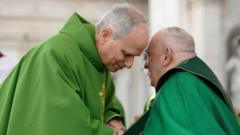In a swift conclave, Cardinal Robert Prevost has emerged as the chosen leader of the Catholic Church, now titled Pope Leo XIV. His election reflects a significant consensus among voting cardinals, who recognized his ability to address current challenges the Church faces. Initial discussions prior to the conclave highlighted two primary themes: "continuity" and "unity," essential for navigating the intricacies of a diverse and often divided Church body.
Throughout his journey to the papacy, Prevost gained respect for echoing the inclusive outreach initiated by Pope Francis, making connections with those marginalized by society. His previous work raised appreciation for giving voice to the voiceless and addressing the needs of the underprivileged. However, he is also seen as someone capable of bridging the gap between traditionalist and progressive factions within the Church, a critical aspect highlighted during the discussions leading up to his election.
As war and division cast a shadow over the global community, cardinals weighed their responsibilities not only to the Church but also to humanity. Prevost, who has roots in both the US and Peru, offers a unique perspective and connectivity that may allow him to appeal across cultural lines. In his inaugural speech from the Vatican balcony, Pope Leo XIV referenced "building bridges" and emphasized a vision of global unity, themes reminiscent of his predecessor.
In the weeks and months ahead, the new pope's decisions will be closely observed. His approaches to pressing matters such as climate change and inequality, alongside his historical views on social issues, will shape his leadership. Despite the scrutiny, the cardinals appear confident Prevost can guide the Church as a moral compass during difficult times.
While he faces considerable challenges, the decisive nature of his election indicates strong support and expectations for a transformative papacy characterized by continuity and unity.
Throughout his journey to the papacy, Prevost gained respect for echoing the inclusive outreach initiated by Pope Francis, making connections with those marginalized by society. His previous work raised appreciation for giving voice to the voiceless and addressing the needs of the underprivileged. However, he is also seen as someone capable of bridging the gap between traditionalist and progressive factions within the Church, a critical aspect highlighted during the discussions leading up to his election.
As war and division cast a shadow over the global community, cardinals weighed their responsibilities not only to the Church but also to humanity. Prevost, who has roots in both the US and Peru, offers a unique perspective and connectivity that may allow him to appeal across cultural lines. In his inaugural speech from the Vatican balcony, Pope Leo XIV referenced "building bridges" and emphasized a vision of global unity, themes reminiscent of his predecessor.
In the weeks and months ahead, the new pope's decisions will be closely observed. His approaches to pressing matters such as climate change and inequality, alongside his historical views on social issues, will shape his leadership. Despite the scrutiny, the cardinals appear confident Prevost can guide the Church as a moral compass during difficult times.
While he faces considerable challenges, the decisive nature of his election indicates strong support and expectations for a transformative papacy characterized by continuity and unity.




















